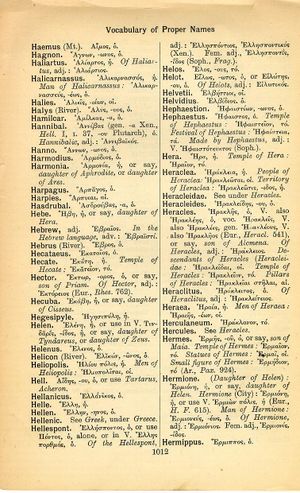Halicarnassus
νύμφην τ' ἄνυμφον παρθένον τ' ἀπάρθενον → wife unwed and virgin that is no virgin | bride that is no bride, virgin that is virgin no more | virgin wife and widowed maid | unwed bride and ravished virgin
English > Greek (Woodhouse)
Ἁλικαρνασσός, ἡ.
Man of Halicarnassus: Ἁλικαρνασσεύς, -έως, ὁ.
Latin > English (Lewis & Short)
Hălĭcarnassus: (-sos) or Hali-carnāsus, i, f., = Ἁλικαρνασσός>,
I a city of great antiquity in Caria, the birthplace of the historians Herodotus and Dionysius, also celebrated for the mausolēum erected there, now Bodrun or Boudroum, Mel. 1, 16, 2 and 3; Plin. 5, 29, 29, § 107; Cic. Tusc. 3, 31, 75; id. Q. Fr. 1, 1, 8, § 25; Liv. 37, 10, 11. —
II Derivv.
A Hălĭcarnasseus, ĕi and ĕos, m. adj., = Ἁλικαρνασσεύς, of Halicarnassus: Scylax, Cic. Div. 2, 42, 88: Dionysius, Quint. 3, 1, 16: Cleon, Nep. Lys. 5.—
B Hălĭcarnassĭi, ōrum, m., the inhabitants of Halicarnassus, Halicarnassians, Tac. A. 4, 55.—
C Hălĭcarnas-senses, ĭum, m., the same, Liv. 33, 20, 12.

